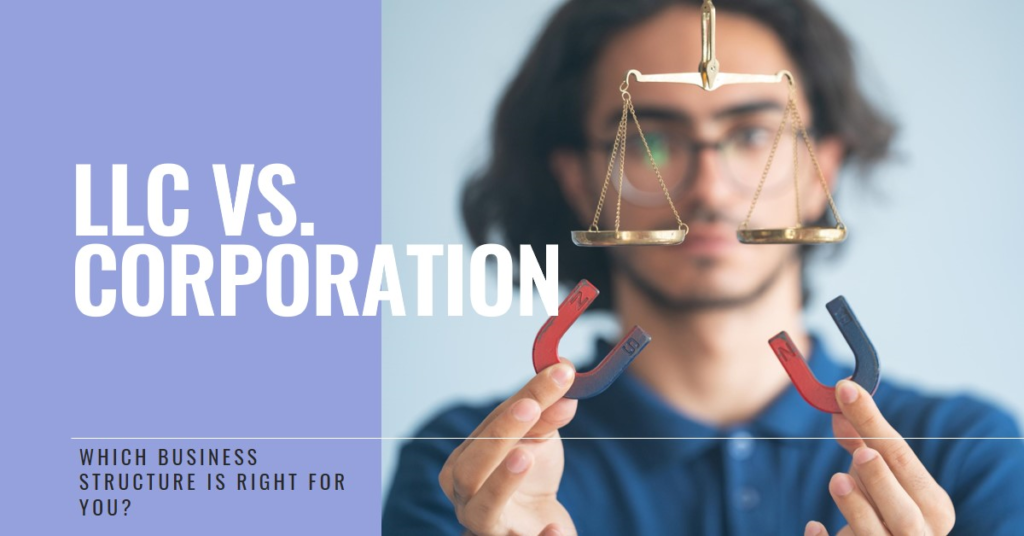When starting a business, one of the most crucial decisions is choosing the right structure. The choice between an LLC vs. Corporation can impact taxes, liability, and your company’s operations. To help you make an informed decision, we’ll break down the key differences between these two business entities. Introduction to LLC vs. Corporation Both LLCs […]

LLC vs. Corporation: Which Business Structure is Right for You?
Blueprint
When starting a business, one of the most crucial decisions is choosing the right structure. The choice between an LLC vs. Corporation can impact taxes, liability, and your company’s operations.
To help you make an informed decision, we’ll break down the key differences between these two business entities.
Introduction to LLC vs. Corporation
Both LLCs (Limited Liability Companies) and corporations offer legal protections that can shield your personal assets from business liabilities.
However, they differ significantly in terms of taxation, management structure, and flexibility.
Deciding between LLC vs. Corporation depends on your business goals, operational preferences, and how you want to handle taxes and compliance.
What Is an LLC?
An LLC, or Limited Liability Company, combines the simplicity of a partnership with the legal protection of a corporation.
It is a highly flexible business structure and is often chosen by small business owners due to its ease of formation and management.
Key Features of an LLC
- Liability Protection: Owners, known as members, are not personally responsible for the debts and liabilities of the business.
- Pass-Through Taxation: Profits and losses pass through to the members, who report them on their personal tax returns. This avoids the double taxation that occurs with corporations.
- Flexible Management: LLCs offer flexibility in terms of management structure. You can choose between member-managed or manager-managed, depending on your preference.
- Less Formality: LLCs have fewer formal requirements compared to corporations. There’s no need for annual meetings or maintaining a board of directors.
Advantages of an LLC
- Simplicity: The formation and ongoing maintenance of an LLC is simpler compared to a corporation.
- Tax Flexibility: LLCs can choose how they want to be taxed—either as a sole proprietorship, partnership, S corporation, or C corporation.
- Ownership Flexibility: LLCs have no restrictions on the number or type of owners. Members can be individuals, other LLCs, or corporations.
- Operational Flexibility: You can choose how your LLC will be managed and who will be responsible for decision-making.
What Is a Corporation?
A corporation is a legal entity that exists separately from its owners, known as shareholders.
Corporations can raise capital by issuing shares of stock, making them a popular choice for larger businesses or those planning to attract investors.
Key Features of a Corporation
- Limited Liability: Shareholders are not personally liable for the debts of the corporation, which means their personal assets are protected.
- Double Taxation: In a C corporation, profits are taxed at both the corporate level and again when distributed to shareholders as dividends. However, an S corporation allows for pass-through taxation similar to an LLC.
- Formal Structure: Corporations require a more formal management structure, including a board of directors and officers.
- Perpetual Existence: Unlike an LLC, which may dissolve upon a member’s departure, a corporation can continue indefinitely.
Advantages of a Corporation
- Ability to Raise Capital: Corporations can issue shares of stock, making it easier to raise capital for growth.
- Unlimited Life: A corporation’s existence does not depend on the lives of its shareholders. The business continues even if ownership changes.
- Separation of Ownership and Management: Corporations separate ownership (shareholders) from management (officers), which can help streamline decision-making in larger organizations.
- Enhanced Credibility: Many investors and larger clients view corporations as more established and credible, which can be an advantage in competitive industries.
LLC vs. Corporation: Tax Considerations

Taxes are one of the biggest differences when considering LLC vs. Corporation.
Let’s look at how these two structures are taxed.
LLC Taxation
LLCs benefit from pass-through taxation. The business itself does not pay taxes. Instead, profits and losses pass through to the members, who report them on their personal tax returns.
This can lead to significant tax savings, especially for small businesses.
In addition, LLCs can choose to be taxed as an S corporation or a C corporation, which may offer additional tax advantages depending on the business’s income and structure.
Corporation Taxation
C corporations are subject to double taxation. First, the corporation pays taxes on its profits.
Then, when profits are distributed as dividends to shareholders, they are taxed again on their personal returns.
However, C corporations can benefit from certain deductions and credits not available to other business entities.
S corporations, on the other hand, avoid double taxation by allowing profits to pass through to shareholders’ personal tax returns.
However, S corporations have strict eligibility requirements, including a limit on the number of shareholders and restrictions on ownership.
LLC vs. Corporation: Management Structure
Another key difference between LLC vs. Corporation is how they are managed.
LLC Management
LLCs offer more flexibility in management. You can opt for a member-managed LLC, where all owners are involved in day-to-day operations, or a manager-managed LLC, where you appoint managers to handle operations. This allows business owners to choose a structure that aligns with their level of involvement.
Corporation Management
Corporations follow a more rigid management structure. They are required to have a board of directors, which oversees the corporation’s activities and appoints officers (such as a CEO or CFO) to manage day-to-day operations.
This structure is more formal but ensures clear separation between ownership and management.
LLC vs. Corporation: Liability Protection
Both LLCs and corporations provide limited liability protection. This means that owners (members in an LLC or shareholders in a corporation) are not personally responsible for the company’s debts or liabilities.
However, there are some distinctions in how this protection works.
LLC Liability Protection
LLCs offer strong liability protection for their members. In most cases, personal assets are shielded from business debts.
However, members can lose this protection if they fail to maintain the necessary legal and financial separations between their personal and business finances (commingling funds).
Corporation Liability Protection
Corporations also provide limited liability protection. Shareholders’ personal assets are generally protected from the corporation’s liabilities.
This protection is usually stronger in corporations because of the formal structure and legal precedents established around corporate entities.
LLC vs. Corporation: Compliance and Formalities
LLC Compliance Requirements
LLCs are known for their simplicity in terms of compliance. They are not required to hold annual meetings or maintain detailed records of decisions.
However, LLCs still need to file annual reports in most states and ensure they keep business and personal finances separate.
Corporation Compliance Requirements
Corporations must adhere to stricter compliance requirements.
This includes holding annual shareholder meetings, keeping minutes of those meetings, and maintaining detailed records of corporate decisions. While this adds complexity, it also enhances transparency and accountability.
LLC vs. Corporation: Funding and Investment
If your business plans to seek external funding, the structure you choose can impact your ability to attract investors.
LLC Funding
LLCs can raise funds by bringing in new members or securing loans.
However, they do not issue stock, which can make it more challenging to raise large amounts of capital from investors.
Corporation Funding
Corporations have an advantage when it comes to raising capital.
They can issue shares of stock, making it easier to attract investors.
This is one of the reasons corporations are often chosen by businesses that plan to scale or go public.
Final Thoughts: LLC vs. Corporation – Which Is Right for You?
The decision between LLC vs. Corporation depends on your business’s specific needs and goals.
If you value simplicity, flexibility, and pass-through taxation, an LLC may be the better choice.
However, if you plan to raise capital, expand quickly, or establish a formal management structure, a corporation may be the better fit.
We recommend carefully considering your long-term goals, consulting with legal and tax professionals, and evaluating the pros and cons of each structure before making a decision.
Are you still torn between which option to bet your money on?
Check out this step-by-step video on how to set up an LLC;




